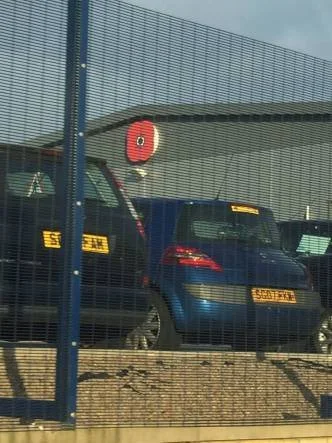‘Support Our Troops’ Builds Support For War – The Poppy Appeal
From Éirígí Scotland:
Every year we see the ‘remembrance’ period extended further and further beyond it’s traditional date of the 11th of November, becoming more of a spectacle and more public as companies, media outlets and even football teams jump on the military bandwagon in the name of ‘remembrance’.
The poppy itself, which is meant to represent the fallen of the Great War 1914-1918, has since become an umbrella symbol for the British army personnel for all conflicts they have been active participants in. Not only is the original conflict suffering in the field of revisionism, the millions of working class sacrifices to the cause of imperialism have been made out to be gallant heroes dying for a noble cause, this extends now to modern soldiers who are being slaughtered on the battlefield far from home today.
And so it begins, this picture was taken on the 13th of October at the First Bus depot in Gorbals, Glasgow.
The Great War, or the ‘war to end all wars’ must be seen for what it was – mass genocide of the working class population in which many Scottish and Irishmen died as well as English, German, Russian and many others. Let’s not forget, the King of England, the Kaiser of Germany and Tsar of Russia were all cousins to each other – the great war of European Imperialism was also in the simplest terms a family dispute, yet millions of lives were extinguished in their name. Any attempt to frame this as a justified battle of opposing nationalism is insulting to the dead and to the intelligence of those living today.
Today that nationalism has permeated into various sections of public and private life, the poppy used to be an optional thing to wear but has become a permanent feature of pretty much anyone on TV in November, to the extent that by not wearing one you are in essence anti-British. James McLean is a prime example of a sportsman who is berated yearly for choosing not to wear one, being from Derry he has made his opposition to refusing the poppy on his jersey very clear, yet the character assassination persists.
Now our public transport in Glasgow has become the latest victim in the poppy craze, where you will see the poppy displayed on the front of each First bus, this on top of the numbers of people milling about the city centre trying to sell you one.
The symbol of remembrance has now been appropriated as the symbol of modern militarism, to support the troops’ and ‘remember the heroes’ who die for ‘you’re freedom’, there is a very American styled feel to this take on the armed forces.
Britain needs it’s army, it has been the symbol of it’s power through the Empire and something it prides itself in. But support for wars are low after Iraq, recruits to the army are often working class boys who feel they have nothing else to do with their lives and are sold with grand visions of defending Britain and seeing the world. George Carlin once said, “War is rich old men protecting their wealth by sending lower and middle-class young men off to die.” This is the truth the world over.
To oppose Imperialist militarism must be a vital pillar of socialism in the 21st century, the world is indeed becoming more unstable, and our governments will try and pit us against our fellow man in foreign countries to push their own agenda. The Second International had real power to convince the working class to not participate in the Great War, but the leaders of the various Socialist groups bottled it and voted for war credits in their respective nations. The pressure of nationalism overtook their internationalist solidarity with people of their class from around the world, and they ended up killing each other in the trenches.
With Britain increasingly isolating itself, the rise of racism and ‘Britain for the British’ will only see the poppy fascination become worse in the years to come. British nationalism is the most poisonous of them all, the symbol of the poppy has been perverted into not only remembrance, but justification of present and future conflicts.

